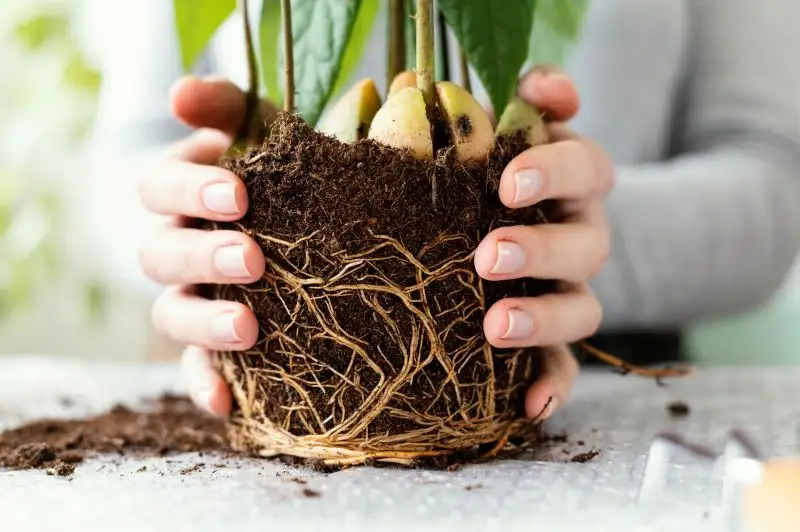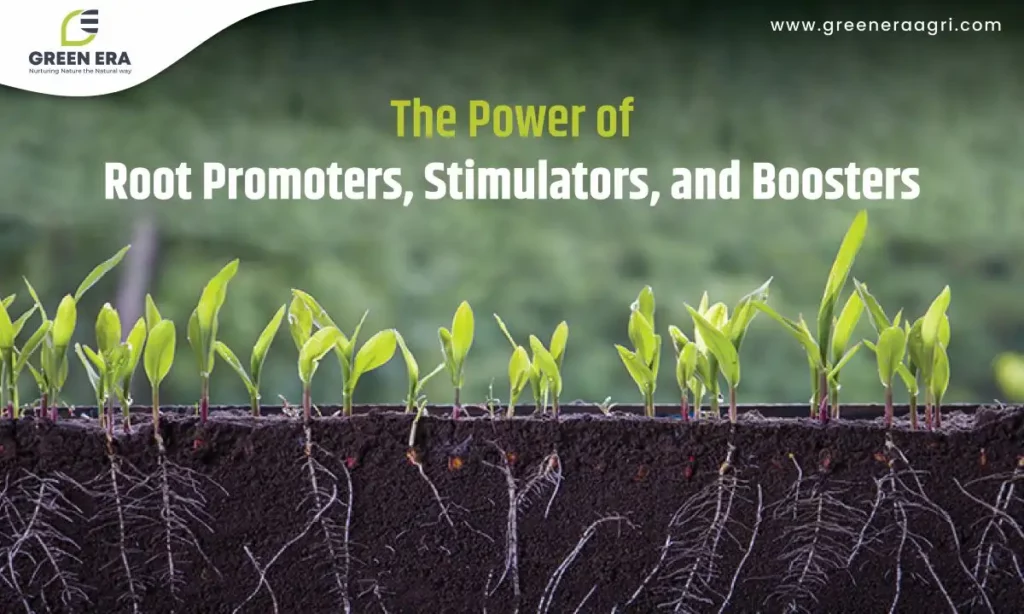In the realm of gardening, achieving optimal plant growth is essential for maximizing yields and ensuring the overall health of plants. A key factor in this equation is the development of robust and healthy root systems. Plant root growth promoters, stimulators, and boosters play a vital role in this process, aiding plants in their quest for nutrients and water uptake. In this extended blog, we will delve into the science behind these essential tools, highlighting their significance in modern agriculture and how they contribute to sustainable farming practices.
What Are the Consequences of Poor Root Growth?

Neglecting root development can have far-reaching and detrimental consequences on the health and productivity of plants. When root growth is stunted or underdeveloped, a cascade of challenges arises, profoundly impacting the overall well-being of the plant.
- Reduced Nutrient Uptake: A weakened or shallow root system has limited access to essential nutrients present in the soil. As roots are the primary means through which plants acquire vital elements like nitrogen, phosphorus, and potassium, poor root development leads to nutrient deficiencies. These deficiencies manifest as visible symptoms such as yellowing leaves, poor growth, and decreased flowering and fruiting. Inadequate nutrient uptake not only hampers plant growth but also diminishes the quality and quantity of yields, posing significant challenges for both commercial agriculture and home gardening.
- Limited Water Absorption: Insufficient root growth compromises a plant’s ability to absorb water effectively. This is particularly concerning in regions prone to drought or erratic rainfall patterns. Plants with underdeveloped root systems struggle to extract enough moisture from the soil, leaving them vulnerable to water stress. The consequences of water stress include wilting, leaf desiccation, and reduced photosynthesis, all of which can hinder a plant’s capacity to produce energy and vital compounds.
- Increased Vulnerability to Stressors: Weak root systems render plants more susceptible to a range of environmental stressors. Drought, for instance, can quickly overwhelm plants with poor root development, as they lack the extensive network necessary to tap into deeper soil layers where water reserves may still be available. Similarly, in disease-prone environments, plants with inadequate roots struggle to defend against pathogens effectively. Strong roots, on the other hand, play a pivotal role in the plant’s immune response, aiding in disease resistance.
- Lack of Stability: Beyond nutrient and water absorption, roots serve as the anchor for plants in the soil. In regions susceptible to storms, heavy winds, or even the weight of a laden fruit-bearing plant, strong roots are essential for stability. Plants with weak or shallow root systems are more likely to be uprooted or damaged, resulting in physical harm and potential crop loss.
Understanding Root Growth Enhancement

1. Plant Root Growth Promoter: A Catalyst for Root Development
Plant root growth promoters are formulated products that contain various compounds designed to stimulate and enhance root growth. These promoters work by activating specific biochemical pathways within the plant, encouraging the formation of new roots and root hairs. Key ingredients often found in root growth promoters include auxins, cytokinin’s, and gibberellins, which are plant growth hormones that play pivotal roles in root development.
Auxins: Coordinating Growth and Direction
- Auxins are plant hormones that play a fundamental role in the regulation of growth and development. These hormones are particularly influential in the context of root growth. One of their primary functions is to stimulate cell elongation and division within the plant, which is essential for the development of lateral and adventitious roots. By promoting cell elongation, auxins help roots reach deeper into the soil and explore a larger area in search of water and nutrients. Moreover, auxins exhibit phototropic responses, which means they enable plants to grow towards sources of light, ensuring that the plant’s energy is channeled towards areas where it can maximize photosynthesis. This directional growth not only enhances root efficiency but also helps plants adapt to their environment by directing their root systems to areas rich in essential resources.
Cytokinins: Orchestrating Root Meristem Formation
- Cytokinins are another class of plant growth hormones vital for root development. They are primarily responsible for promoting cell division and differentiation within the root’s meristem region. The meristem is the area of active growth at the tip of the root, and cytokinins ensure that this region remains highly active. By encouraging cell division, cytokinins contribute to the formation of new root cells, expanding the root system. Moreover, these hormones counteract apical dominance, a phenomenon where the plant’s main shoot apex inhibits the growth of lateral branches and roots. By counteracting apical dominance, cytokinins foster lateral root growth, creating a more extensive network of roots. This lateral branching enhances the plant’s ability to explore a larger soil volume, increasing its access to essential resources like water and nutrients.
Gibberellins: Boosting Growth Above and Below Ground
- Gibberellins are multifaceted plant growth hormones that play a critical role in root development. These hormones are known for their ability to stimulate stem and root elongation. In the context of root growth, gibberellins are key players in helping plants establish a robust root system. By promoting both stem and root elongation, gibberellins contribute to the overall plant structure, ensuring that the roots delve deeper into the soil. This deeper root penetration allows plants to access water and nutrients from lower soil layers, making them more resilient during dry spells. Additionally, gibberellins have been shown to influence the formation of root hairs, tiny protrusions on the root surface that significantly increase the root’s surface area for absorption. This increased surface area enhances the plant’s capacity to absorb water and nutrients, ultimately supporting its overall health and productivity.
2. Plant Root Growth Stimulator: Nurturing Root Health
Root growth stimulators, while similar to promoters, often focus on maintaining root health and resilience in challenging environmental conditions. These products contain nutrients and bio-stimulants that improve root vitality, making them more resistant to stressors like drought, disease, and nutrient deficiencies. Root stimulators often contain mycorrhizal fungi, beneficial bacteria, and humic substances.
- Mycorrhizal Fungi: These beneficial fungi form symbiotic relationships with plant roots, enhancing nutrient and water uptake. They also help protect plants from pathogens.
- Beneficial Bacteria: Certain strains of bacteria promote root growth and nutrient absorption while suppressing harmful pathogens.
- Humic Substances: Humic acids in root stimulators improve soil structure and increase nutrient availability for roots.
3. Plant Root Booster: Fuelling Nutrient and Water Uptake
Plant Root boosters are specifically designed to enhance the plant’s ability to absorb nutrients and water from the soil. They typically contain compounds that improve the soil’s nutrient-holding capacity, reduce compaction, and increase root surface area.
- Soil Conditioners: These components help create a favorable environment for root growth by improving soil aeration and water retention.
- Root-Zone Enhancers: Root boosters may contain surfactants that improve water infiltration into the soil, ensuring roots can access moisture more effectively.
- Micronutrients: Some root boosters supply essential micronutrients like iron, zinc, and copper, which are crucial for various plant metabolic processes.
Here is one stop solution – Root Rex
- Root Rex – An Organic Powerhouse, for those seeking an organic solution for promoting root growth, Root Rex is an exceptional choice. This 100% organic product harnesses the power of natural ingredients to stimulate robust root development. With its strong root-promoting actions, Root Rex ensures that your plants develop healthy, extensive root systems, equipping them to thrive in various conditions.
Conclusion
The role of plant root growth promoters, stimulators, and boosters covers imp aspects of any plant’s life. These products empower farmers and gardeners to maximize crop yields, reduce water and nutrient wastage, and enhance plant resilience in the face of environmental challenges.
When utilized correctly and in conjunction with sound agricultural practices, these tools become invaluable assets in the quest for higher yields, healthier crops, and a more sustainable future for agriculture. Whether you’re a commercial farmer or a home gardener, understanding and implementing these root-enhancing solutions can make a substantial difference in your plant’s overall health and productivity. With organic options like Root Rex available, you can promote root growth while adhering to environmentally friendly and sustainable practices, ensuring a brighter future for agriculture.
Frequently Asked Questions (FAQs)
-
Are root growth promoters, stimulators, and boosters safe for the environment and my plants?
Answer: Yes, when used as directed, these products are generally safe for both the environment and your plants. Many modern formulations are designed to be environmentally friendly and pose no harm to beneficial soil organisms. However, it’s crucial to follow the manufacturer’s instructions and use these products in moderation to avoid overapplication, which can have adverse effects.
-
Can I use root growth enhancers on all types of plants, including vegetables, fruits, and ornamentals?
Answer: Yes, root growth enhancers can be used on a wide variety of plants, including vegetables, fruits, and ornamental species.
-
How long does it take to see the effects of root growth promoters and stimulators on my plants?
Answer: The timeline for seeing results can vary depending on factors such as the type of product used, the plant species, and the current condition of the plant.
-
Can I use root growth enhancers in hydroponics or container gardening?
Answer: Yes, root growth enhancers can be beneficial in hydroponics and container gardening. In these controlled environments, it’s essential to provide plants with optimal root health, as they rely on nutrient-rich solutions or limited soil volumes.
-
Are there natural or organic alternatives to synthetic root growth promoters?
Answer: Yes, there are organic options available for those who prefer natural solutions. Products like Root Rex, as mentioned earlier, are completely organic and harness the power of natural compounds to stimulate root growth.



